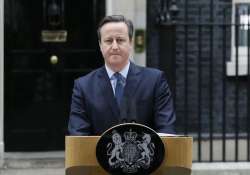Britain's referendum on European Union membership to be June 23
London: A historic referendum on whether Britain should stay in the European Union will be held on June 23, Prime Minister David Cameron announced Saturday, even as he declared his belief that the U.K. would

London: A historic referendum on whether Britain should stay in the European Union will be held on June 23, Prime Minister David Cameron announced Saturday, even as he declared his belief that the U.K. would be “safer and stronger” if it remained in the 28-nation bloc.
Cameron spoke in front of his 10 Downing Street office after holding a rare Saturday Cabinet meeting and winning its agreement to recommend that Britain remain part of the EU rather than strike out on its own.
Despite that support, some Cabinet figures will back the “leave” campaign that wants Britain to carve its own path outside of the EU bureaucracy in Brussels.
Cameron said if Britons decided to remain in the EU, he would seek continued reforms to address their concerns about job losses and benefit payments to EU migrants seeking work in Britain.
“I don't love Brussels, I love Britain,” he said, emphasizing that Britain can have “the best of both worlds” if it remains in the EU under a reform deal he reached Friday night with EU leaders.
The June vote will come as the EU struggles to deal with a sustained immigration crisis that last year brought more than 1 million people fleeing war and poverty to its shores.
Cameron is poised to lead the campaign for Britain to remain in the bloc in what is expected to be a closely fought referendum — yet still faces skepticism from within his own Conservative Party.
Justice Secretary Michael Gove was the first to publicly oppose continued EU membership after Saturday's meeting, saying Britain would be better off on its own. He said it pained him to break ranks with Cameron.
Two strong future Conservative party leadership contenders, Home Secretary Theresa May and Treasury chief George Osborne, indicated support for staying within the EU, as did Scottish National Party leader Nicola Sturgeon.
London Mayor Boris Johnson, another influential Conservative figure seen by some as a possible future party leader, has so far kept his intentions to himself.
Opposition Labour Party leader Jeremy Corbyn said he will support Britain's continued membership in the EU, though he said Cameron's vaunted “renegotiation” of the terms of its relationship with the EU will have little impact.
Much of the opposition to EU membership comes from the UK Independence Party led by Nigel Farage and from skeptical members of Cameron's own party.
The deal Cameron agreed upon Friday with 27 other EU leaders protects Britain from taking part in an “ever closer union” with European nations and makes clear that Britain will not adopt the euro currency shared by 19 EU nations. Cameron says it also protects British interests and restricts British welfare payments to migrants from other EU nations.